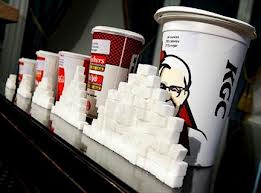Sixty-Four Ounce Sodas I Shall Not Want
“WE DON’T NEED BUREAUCRATS TELLING US WHAT BERVERAGES TO BUY!” That’s the dyspeptic protest I’m seeing on posters and t-shirts, sparked by New York Mayor Michael Bloomberg’s attempt to ban large sodas in the city. His anti-obesity crusade aims to make sixteen ounces the limit—at restaurants, delis, movie theatres, sports arenas, and food carts. This may seem a purely political fight, but hidden in the story is a deeply spiritual insight.
The reason for limiting the largest size soda is not because too many people are ordering that thirty-two ounce Coke (or that sixty-four ounce “Big Gulp” at 7-Eleven), but because the mere presence of something that large on the menu is skewing all our choices—up.
There’s a classic economic experiment where people were asked to choose between two cameras: a cheap one, and a more expensive model with more features. People split almost evenly between the two choices. But when researchers added a third option—a pro-level, very expensive camera—far more people chose the “middle” option. Now it looked far less extravagant.
Then there’s the M&M experiment. They put a bowl of M&Ms out on the concierge table of an apartment building with a little sign that said, “Eat Your Fill.” One day they put out a tablespoon-sized scoop, and the next day they’d have a scoop that held a quarter cup. No surprise: on days when the quarter-cupper was out, it took a lot more M&Ms to get your “fill.”
At the heart of the soda controversy is this little nagging problem. We don’t really know what we want. We’re not sure what will fill us. And without really knowing it, we’re looking for cues out there to tell us what to seize on. We’re human, susceptible to suggestion, to nudges. That’s only natural. Which is why being spiritually grounded is so important.
Because the subtle but powerful forces that guide our choices of sodas and cameras and M&Ms are also shaping our most significant choices—and we don’t even know it. I used to think this house was just fine, but now I’m not happy living here. I used to desire my husband, now I don’t. What’s changed? Nora Ephron wrote a bestselling book called, “I Feel Bad About My Neck.” Why? Compared to what? whose?
When we ground our hearts in God, we experience fullness, completeness, rightness. Like those well-known words, “The Lord is my shepherd, I shall not want.” Once you know what it feels like to be that secure, that satisfied, you have a baseline for comparison. And—this is important—it is held within. You don’t need to look out there somewhere for clues and cues as to what (or how much) you need or want or desire. You have a gold standard within. Another Psalm says it perfectly. “Delight yourself in the Lord, and he will give you the desires of your heart” (37:4).

Great post, David. Needed this reminder this morning. Thanks.
You said it!That’s a great way to express what “complete” is all about,deep in the heart.Blessings, Mugsie